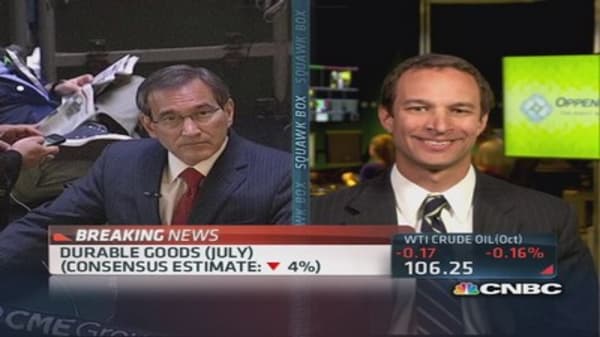1) China's Shanghai index rose 1.9 percent overnight. A spokesman for the Cabinet's statistics agency "There are growing signs of stabilization and also of further growth," the spokesperson said. "We are confident we can hit our full-year growth target."
While that's not much to go on, both Citigroup and Credit Suisse reportedly upped their China GDP outlook.
2) Italian stocks are down 2.4 percent on more political instability. Berlusconi's center-right coalition is threatening to bring down the government if the government votes to expel him from parliament. The former prime minister was recently convicted of tax fraud.
3) BATs and Direct Edgeannounced a merger today. I noted on Friday that the deal makes sense for several reasons, most importantly because it would increase the market share for stock trading, which is an increasingly low-margin, low profit business. The combined entity would control 21 percent of all stock trading, making it the second largest exchange in the U.S. after the NYSE.
Exchange market share (source: Tabb Group)
NYSE 23%
NASDAQ 18%
Direct Edge 11%
BATS 10%
Internalized 37%
4) Muriel Siebert, RIP. The dean of female brokers died this weekend at 80. I met with Muriel on the floor many times in the past 17 years. Despite her many accomplishments she was always most proud of the fact that she was the first woman to own a seat at the NYSE, beginning in 1967. She never actually worked on the floor, but she was a frequent visitor.
She loved to tell everyone that when she came here there was no ladies room on the floor. This did not seem to irk her as much as the fact that there was no ladies room in the Luncheon Club on the seventh floor! That's when she put her foot down. They had to build a ladies room there, next to the men's room. But— shades of Get Smart! (which had just debuted two years before)— they had to build the entrance through one of the phone booths.
So to get to the Ladies Room at the Luncheon Club, the ladies had to go through phone booth #5, a story Art Cashin still likes to tell.
—By CNBC's Bob Pisani












